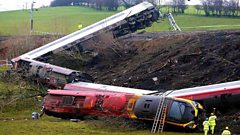Crash risk; Mary Rose bacteria; History of Science; Greenwich telescope
Are trains more likely to crash in summer? Plus, the conservation scientists battling a metal-eating bacteria threatening to destroy the Mary Rose. Presented by Adam Rutherford.
July has seen train crashes in Canada, Pakistan, France, Spain and Switzerland. Inside Science asks if this is a trend or just a coincidence. Professor David Spiegelhalter, an expert in the public perception of risk, explains whether there is such a thing as a 'crash season'.
Microbiologists working on the Mary Rose in Portsmouth have discovered a new type of metal-eating bacteria which is damaging the ship's wooden timbers. Reporter Gaia Vince goes behind the scenes at Portsmouth's Historic Dockyards to find out how conservation scientists have saved the ship.
Last week Manchester hosted the 2013 International Congress of History of Science Technology and Medicine, the biggest ever meeting of historians of science from around the world. The keynote speech was given by Prof Hasok Chang of the University of Cambridge, urging his colleagues to put "Science back in History of Science". Inside Science asked him if there should also be more history in the practice of science...
Finally, Dr Marek Kukula Public Astronomer at the Greenwich Observatory shows us his instrument - the 28inch refracting telescope which historians at the time likened to a Spanish onion, or the Taj Mahal.
Last on
Clip
-
![]()
Is there a train crash season?
Duration: 02:50
Mary Rose

Broadcasts
- Thu 1 Aug 2013 16:30大象传媒 Radio 4 FM
- Thu 1 Aug 2013 21:00大象传媒 Radio 4
Explore further with The Open University
Discover more fascinating science content with The Open University
Podcast
-
![]()
大象传媒 Inside Science
A weekly programme looking at the science that's changing our world.



